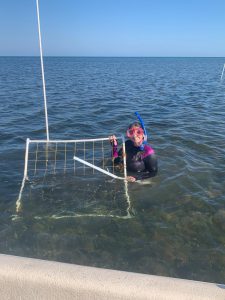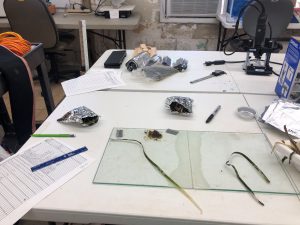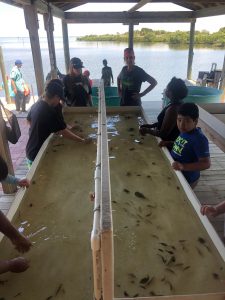NCBS Intern Report written by Jasmine Schwadron, and host Dr. Charlie Martin, Estuarine Ecologist at UF/IFAS NCBS
Introduction
This summer I had the incredible opportunity to intern at the Nature Coast Biological Station under Charlie Martin working on projects focused on estuarine ecology. I got so much relevant marine science experience and loved that my tasks were so diverse. I used this as an experience to further guide me into what aspects of marine science I really want to focus on for my career.
 Field Experience
Field Experience
My days in the field were the most memorable for me and they were the days that I feel I learned the most. My field days were split between the NOAA Restore project and helping a graduate student, Theresa, with her research. During the NOAA restore project I learned skills such as trawling, taking quadrats, taking sediment cores, identifying fish, using GPS navigation, taking data on environmental conditions, and recording organized data. These skills will all be applicable for my future positions in marine research. This was a rewarding project for me because of practicing these useful skills and the fact that this is a very significant and large-scale project that many institutions are working on together. With Theresa’s project, I got to assist with finding prop scars, taking sediment cores, measuring experimental units, and putting underwater cameras in those units.
 Lab Experience
Lab Experience
The majority of my time at NCBS was spent in the lab working on seagrass cores for the NOAA Restore project. This involved recording data from cores previously taken in the field in various locations. Data that was recorded for each core sample included the species present, the number of shoots of each species present, the dimensions of each blade of seagrass, the above ground biomass for each species (grams), the below ground biomass for each species (grams), and the epiphyte biomass for the sample (grams). My time in the lab gave me experience with seagrass identification, taking measurements, working with scales, being accurate and organized, and training others. I also spent some time aging spotted sea trout with otoliths which was very interesting and gave me great microscope experience!

Education Experience
Another amazing part of this internship was getting to help assist with educational programs. I helped with a few “Discovery Days” where fifth graders came to Seahorse Key to learn about the local ecosystem. I had so much fun with the kids and it made me so happy to see how much joy they got from being on the island and getting to see marine organisms first-hand. We did trawling, a food web activity, a scavenger hunt, and a fish dissection. At first, I assisted with all activities, and then began leading the food web activity and scavenger hunt. I truly feel that I influenced these students positively and many even said they wanted my job when they grew up!
Acknowledgements
Thank you to Charlie Martin, Mike Allen, and Savanna Barry for making this internship possible for me. Thank you to Ashley McDonald, Scott Alford, Theresa Gruninger, Samara Nehemiah, and Jeff Greenspan for teaching me so much throughout the internship. Thank you to all the NCBS staff for being so welcoming and helpful with anything I needed. I will truly miss this place and enjoyed this experience immensely.
 0
0
